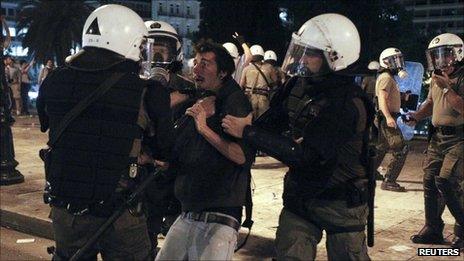EU 'faces its greatest challenge' - Jose Manuel Barroso
- Published

Police and protesters clashed in Athens on Tuesday evening
The head of the European Commission has told Euro MPs that Greece will stay in the eurozone, but warned that the EU was facing its "greatest challenge".
Appealing for patience over the Greek debt crisis in his annual State of the Union address, Manuel Barroso said: "This is not a sprint but a marathon."
Proposing a controversial financial transactions tax and eurobonds, he urged greater economic integration.
There were new protests in Athens ahead of a visit by international lenders.
The so-called troika, made up of the European Commission, European Central Bank (ECB) and International Monetary Fund (IMF), are assessing Greece's eligibility for further bailout money.
The president of the EU Commission Jose Manuel Barroso says the proposed tax is "fair"
A key obstacle to the payment was removed on Tuesday when the Greek parliament passed a controversial new property tax bill, first announced earlier this month, that aims to boost revenues.
Outside parliament, on Syntagma Square, riot police fired tear gas, and reportedly used truncheons, to break up a protest by about 1,000 demonstrators.
Greek tweeters complained that local media were playing down the use of force by police to disperse anti-austerity protesters from the "indignant" movement.
"Strategy of police and government is obviously not to let people gather and demonstrate peacefully in Syntagma," tweeted one leading blogger, @irategreek.
'Emotional arguments'
Mr Barroso's comments about Greece remaining in the eurozone were met with applause in the European Parliament in Strasbourg.
"Greece must implement its commitments in full and on time," Mr Barroso added.
"In turn, the other euro area members have pledged to support Greece and each other."
Speaking about the scale of the crisis, the European Commission chief said: "We are today faced with the greatest challenge our union has known in all its history."
However, he argued, it was both "possible" and "necessary" to overcome it.
He urged stronger EU central government, saying the alternative was "more fragmentation".
"I think this is going to be a baptism of fire for a whole generation," he added.
Commentators noted that Mr Barroso, who at one point quoted Nelson Mandela saying "it always seems impossible until it is done", had delivered an impassioned defence of the the EU and euro.
"At last some emotional arguments in the defence of European Union," tweeted Belgian EU official Rolf Falter (@rolfalter).
UK objections
On the financial transactions tax, Mr Barroso said the financial services sector must "make a contribution".
The European Commission's support for the measure, analysts note, puts it on a collision course with the UK, where Chancellor George Osborne has warned that such taxes could drive investment out of Europe and threaten the interests of the City of London.
A UK Treasury source told the BBC on Wednesday that the British Government would only agree to such a tax if it had been agreed globally.
If there was a formal proposal for such a tax on all 27 EU states, "we would absolutely resist that", the source said.
Mr Barroso also argued that eurobonds would be "advantageous" for the EU.
"Once the euro area is fully equipped with the instruments necessary to ensure both integration and discipline, the issuance of joint debt will be seen as a natural and advantageous step for all," he said.
Mr Barroso said monetary union should be completed by economic union, and the Commission would present plans in the coming weeks
"It was an illusion to think that we could have a common currency and a single market with national approaches to economic and budgetary policy," he said.
Discussions in Athens between the troika and Greek officials are expected to begin on Thursday.
The Commission, ECB and IMF officials will be deciding whether to release about 8bn euros ($11bn; £7bn) from a 110bn bailout package agreed last summer.
Anyone who does not pay the new property tax risks having their power cut off.
The tax is one of a number of austerity measures Athens is introducing, measures that saw Greece's budget deficit fall by more than 5 percentage points in 2010, Greek Prime Minister George Papandreou said on Tuesday.
Speaking in Berlin, he said Greece would fulfil its obligations and hoped to be without a primary deficit from 2012.